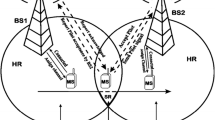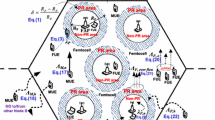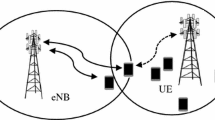Abstract
The next generation (NG) wireless networks are expected to provide mobile users with the real-time multimedia services. High sensitivity to time constraints like delay and jitter is one of the important characteristics of the multimedia traffic. In order to maintain a certain quality of service (QoS) level, the handoff latency should be minimized. Furthermore, if the new cell is not ready at the actual handoff time, the handoff call may be even forced terminated. Hence, the handoff preparation latency directly affects the performance of the cellular networks in terms of QoS support and the handoff blocking probability. In this paper, we present the expected visitor list (EVL) method to achieve reduced handoff blocking probability and maintain a certain QoS level in the network by minimizing handoff preparation latency. The handoff signaling decomposition is introduced to make the neighbor cells aware of the resource demands and QoS requirements of the mobile terminal before the actual handoff time. The obtained information about the prospective active mobile terminal is stored in an EVL entry at the neighbor cells. The call admission control (CAC) with QoS-provisioning is run against each EVL entry. According to the CAC result, the network preparation algorithms are executed and the results are stored in the entry. No resource reservation or allocation is performed in advance, and the varying network conditions are reflected to validity and admission status of the entries. The results of handoff preparation algorithms stored in the EVL entry are activated at the actual handoff time and hence the handoff latency is minimized. Performance evaluation through mathematical analysis and extensive simulation experiments show that the EVL method reduces handoff latency and hence handoff call blocking probability significantly without introducing high overhead.
Similar content being viewed by others
References
I.F. Akyildiz, J. McNair, J.S.M. Ho, H. Uzunalioglu and W. Wang, Mobility management in next generation wireless systems, Proceedings of IEEE 87(8) (1999) 1347–1381.
A. Aljadhai and T. Znati, A Predictive Bandwidth Allocation Scheme For Multimedia Wireless Networks, in: Conference on Communication Networks and Distributed Systems Modeling and Simulation (CNDS ‘97) Phoenix, Arizona (1997) pp. 95–100.
B. Baykal, O.E. Akdemir and O.B. Akan, An IP Multicast Handoff Scheme with Focus on IGMP Sourced Latency, in: Proc. IEEE HSNMC 2002 (Korea, 2002) pp. 361–364.
S. Blake, D. Black, M. Carlson, E. Davies, Z. Wang and W. Weiss, An Architecture for Differentiated Services, in: RFC 2474 (Dec. 1998).
S. Choi and K. Shin, Predictive and Adaptive Bandwidth Reservation For Handoffs in QoS-Sensitive Cellular Networks, in: Proc. ACM SIGCOMM ‘98 (Vancouver, British Columbia, Aug. 1998).
S. Kundu and S. Chakrabarti, Call blocking in a mobile radio system with directed retry and priority handoff, in Proc. IEEE Conf. on Personal Wireless Communications 2002. (2002), pp. 163–167.
D. Levine, I.F. Akyildiz and M. Naghshineh, A Resource Estimation and Call Admission Algorithm for Wireless Multimedia Networks using the Shadow Cluster Concept, IEEE/ACM Trans. Networking 5(1) (1997) 1–8.
W. Li and A.S. Alfa, Channel Reservation for Handoff Calls in a PCS Network, IEEE Trans. Veh. Technol. 49(1) (2000) 95–104.
S. Lu and V. Bharghavan, Adaptive Resource Management Algorithms for Indoor Mobile Computing Environments, in: Proc. ACM SIGCOMM ‘96 (Aug. 1996).
M. Naghshineh and M. Schwartz, Distributed Call Admission Control in Mobile/Wireless Networks, IEEE J. Select. Areas Commun. 14(4) (1996) 711–717.
K. Pahlavan, P. Krishnamurthy, A. Hatami, M. Ylianttila, J.-P. Makela, R. Pichna, and J. Vallström, Handoff in Hybrid Mobile Data Networks, IEEE Pers. Commun. 87(8) (2000) 34–47.
G. P. Pollini, Trends in Handover Design, IEEE Commun. Mag. (March 1996) 82–90.
S. M. Ross, Introduction to Probability and Statistics for Engineers and Scientists, Wiley Series in Probability and Mathematical Statistics (1987).
M. Sidi and D. Starobinski, New call blocking versus handoff blocking in cellular networks, in: Proc. IEEE INFOCOM 1996, (March 1996) vol. 1, pp. 35–42.
A.K. Talukdar, B.R. Badrinath and A. Acharya, On Accomodating Mobile Hosts in An Integrated Services Packet Network, in: Proc. IEEE INFOCOM 97 (April 1997).
J. Wroclawski, The Use of RSVP with IETF Integrated Services, RFC 2210 (Sept. 1997).
M.M. Zonoozi and P. Dassanayake, User Mobility Modeling and Characterization of Mobility Patterns, IEEE J. Select. Areas Commun. 15(7) (1997).
Author information
Authors and Affiliations
Corresponding author
Additional information
Özgür B. Akan received the B.S. and M.S. degrees in electrical and electronics engineering from Bilkent University and Middle East Technical University, Ankara, Turkey, in 1999 and 2001, respectively. He received the Ph.D. degree in electrical and computer engineering from the Broadband and Wireless Networking Laboratory, School of Electrical and Computer Engineering, Georgia Institute of Technology, Atlanta, in 2004. He is currently an Assistant Professor with the Department of Electrical and Electronics Engineering, Middle East Technical University. His current research interests include sensor networks, next-generation wireless networks, and deep space communication networks.
Buyurman Baykal received his B.Sc. (High Hons.) degree in Electrical and Electronics Engineering from Middle East Technical University in 1990; M.Sc. (Distinction) and Ph.D. degrees in 1992 and 1995 from Imperial College of Science, Technology and Medicine. Dr. Baykal has research and teaching interests in speech processing, signal processing for telecommunications, and communication networks. He has extensive experience both in the theory and applications of adaptive signal processing techniques to communication applications such as acoustic echo cancellation, noise reduction, channel equalization and digital receiver design through self-conducted research and industry-funded research projects. He conducts research and implementation work on low bit rate speech coding and content based indexing of audio signals. He is also involved in communication network research with particular interest in ATM/IP design aspects, wireless networks and network management issues. Dr. Baykal is an Associate Editor of Computer Networks (Elsevier Science), Sensor Letters (American Scientific Publishing), a past Associate Editor of the IEEE Transactions on Circuits and Systems Part II—Analog and Digital Signal Processing (TCAS-II). He authored and co-authored over 50 technical papers.
Rights and permissions
About this article
Cite this article
Akan, Ö.B., Baykal, B. Handoff Performance Improvement with Latency Reduction in Next Generation Wireless Networks. Wireless Netw 11, 319–332 (2005). https://doi.org/10.1007/s11276-005-6614-7
Issue Date:
DOI: https://doi.org/10.1007/s11276-005-6614-7




